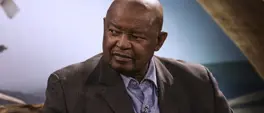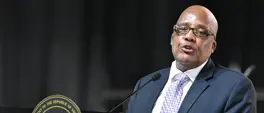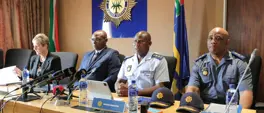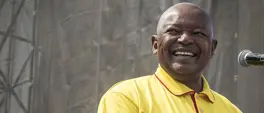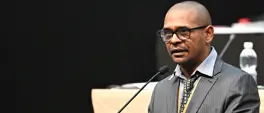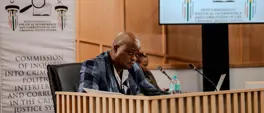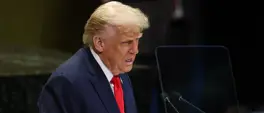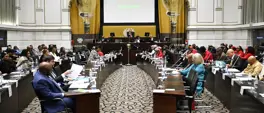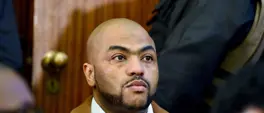CHARLES MATSEKE | How the Madlanga Commission became a Chessboard for power
Charles Matseke
14 October 2025 | 14:34"In chess, when too many pieces are compromised, the board becomes unplayable. That may be the truest metaphor for South Africa’s governance today: a game in which every move protects the king, but the people no longer believe there’s a king worth saving."
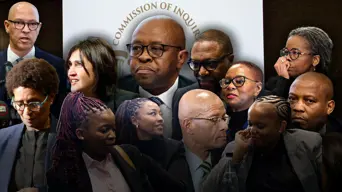
Madlanga Commission of Inquiry montage. Picture: Katlego Jiyane/EWN
In House of Cards, politics was chess with every move calculated, every silence meaningful. South Africa’s Madlanga Commission and Parliament’s ad hoc committee are no different. What was meant to expose police criminality and political interference has become a masterclass in delay, misdirection, and selective transparency. The players are many, but the goal is one: protect the king.
The Madlanga Commission’s decision to hear crucial testimony in camera behind closed doors should alarm anyone who values constitutional accountability. Evidence leaders argue it’s necessary for sensitive intelligence or ongoing operations, but secrecy in a democracy is never neutral. It turns a public inquiry into a managed performance.
Only News24 and Daily Maverick have formally challenged this decision, warning that it violates the principle of open justice. Where are the civic watchdogs? The Helen Suzman Foundation, OUTA, AfriForum, and the self-anointed constitutional guardians have fallen silent. Their passivity grants legitimacy to opacity, normalizing secrecy in the very institutions meant to rebuild public trust.
Once evidence is locked away, the public becomes dependent on filtered summaries, selective leaks, and curated conclusions. The result, a Commission that claims transparency while operating under the logic of containment where truth is rationed, not revealed.
“Too often character assassination has replaced debate in principle … Destroy someone’s reputation, and you don’t have to talk about what he stands for.” Ronald Reagan
In the Madlanga proceedings, this logic reigns supreme. When Lt-Gen Nhlanhla Mkhwanazi testified about political interference and syndicate infiltration, the counterstrategy was swift: discredit the messenger.
Deputy National Commissioner Shadrack Sibiya accused of collusion and manipulation of task teams has mounted a charm offensive of victimhood. He portrays himself as misunderstood, the target of vendettas, while branding Mkhwanazi as rude, aggressive, uncooperative. It’s classic misdirection: shift attention from corruption to temperament, from evidence to attitude.
Criminal networks understand psychology. They know that once the whistleblower’s character is questioned, their evidence becomes suspect no matter how credible. This is not mere reputation warfare; it is strategic narrative control. Mkhwanazi’s “abrasiveness” becomes the story, not his allegations that police units were dismantled to shield powerful interests.
Running parallel to the Commission, Parliament’s ad hoc committee was supposed to provide oversight. Instead, it has turned into a procedural cul-de-sac. Hearings have been postponed, subpoenas deferred, and debates hijacked by party technicalities.
When members quibble over witness order rather than over the murder of whistleblowers, the spectacle becomes self-parody. The committee’s reluctance to summon key witnesses including Mkhwanazi undercuts its credibility. It is playing defense, not oversight.
The result is political theatre disguised as governance: while the Commission shields evidence from the public, Parliament shields politicians from the fallout. Two boards, same game.
Hovering around these inquiries are a constellation of names that blur the line between the state and the underworld: Paul O’Sullivan, Brown Mogotsi, Vusimuzi “Cat” Matlala, and Katiso “KT” Molefe.
• Paul O’Sullivan long seen as an anti-corruption crusader operates so close to the Hawks and SAPS that the line between independent investigator and insider influence is hazy. Mkhwanazi has publicly questioned his neutrality, suggesting O’Sullivan’s alliances inside the security cluster give him disproportionate sway.
• Brown Mogotsi, described in testimony as an “information peddler,” maintains political and intelligence links across factions. Sibiya admits to meeting him frequently including a now-famous Cape Town breakfast that Mogotsi “forgot to pay for.” Such anecdotes normalize intimacy with power brokers who should be subjects of inquiry, not their confidants.
• Vusimuzi “Cat” Matlala, a businessman facing multiple allegations, has been accused of exploiting police information for private enrichment and of financing political campaigns, including those of Mogotsi and Minister Mchunu.
Together, this triad functions like a para-state network influencing internal investigations, manipulating dockets, and shaping narratives from both inside and outside the system.
Enter Katiso Molefe. Earlier this month, the Johannesburg High Court granted him R400 000 bail, reversing a magistrate’s earlier refusal. The NPA objected, citing risks of witness intimidation and interference. His release is more than a legal technicality it changes the rhythm of the board in terms of:
1. Freedom of movement gives him the ability to coordinate with allies, manage perception, and potentially tamper with processes.
2. Public narrative as a “bailed” suspect, he can now re-enter the conversation, reframing his role and discrediting investigators.
3. Psychological impact every official watching sees that even high-profile accused can outmaneuver the state reinforcing cynicism within law enforcement ranks.
In short, Molefe’s bail adds another live piece to the game, complicating already-fragile proceedings. With O’Sullivan’s inside reach, Mogotsi’s political tentacles, and Matlala’s financial muscle, Molefe’s freedom completes a shadow ecosystem capable of derailing institutional accountability.
At the macro level, this entire spectacle unfolds under a president seen as the blue-eyed boy of white monopoly capital a man “with whom business can be done.” Under Cyril Ramaphosa, the balance between reform and reassurance has tilted decisively toward the latter.
The corporate elite, once jittery during the Zuma-Gupta years, now see predictability restored. The language of markets, investment summits, and “stability” dominates political speech. Yet stability for whom? For white monopoly capital or Corporate conglomerates? Certainly not for the public institutions now hollowed by capture.
Ramaphosa’s presidency has institutionalized managed scandal: commissions and committees proliferate, but none threaten the economic or political core. They release pressure without re-wiring power.
The Madlanga Commission thus functions as both investigation and insurance a way to claim anti-corruption credentials while ensuring that the system, and those who benefit from it, remain intact. The performance of accountability replaces accountability itself.
When evidence is hidden, when whistleblowers are vilified, when oversight collapses into choreography, democracy itself becomes theatre. What began as a reckoning with state capture risks ending as a masterclass in political survival?
If South Africa’s security institutions including SAPS, Hawks, Crime Intelligence are now pawns on a board controlled by syndicates and elites, then the question is no longer “who will be charged,” but who still governs.
In chess, when too many pieces are compromised, the board becomes unplayable. That may be the truest metaphor for South Africa’s governance today: a game in which every move protects the king, but the people no longer believe there’s a king worth saving.
Charles Matseke (MPhil in Politics and International Relations) is a researcher and writer with a keen interest in contemporary political dynamics. His research focuses on electoral politics, foreign policy analysis, and international relations, with a particular emphasis on the Global South and Africa's role in global affairs.
Get the whole picture 💡
Take a look at the topic timeline for all related articles.
Trending News
More in Opinion
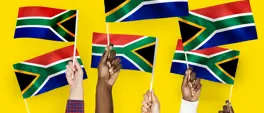
3 March 2026 11:40
Who belongs in South Africa? UCT philosopher weighs in on identity and ownership
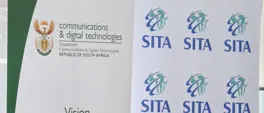
2 March 2026 11:05
TLALI TLALI |Mandate, money and accountability - What the government website debate really reveals

27 February 2026 11:00
JAMIL F. KHAN | Human rights last on the list for global leadership agenda
